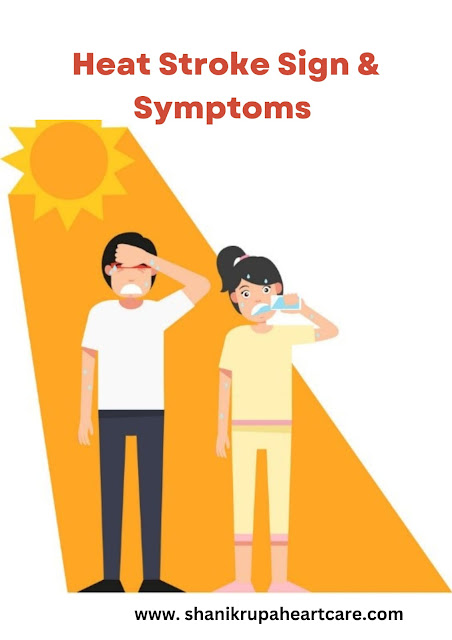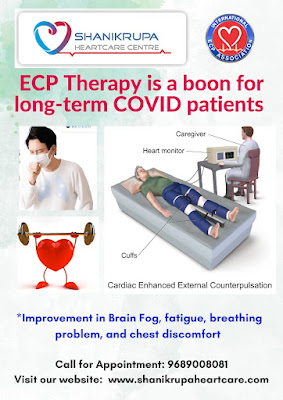HEAT STROKE WARNING SIGNS AND SYMPTOMS YOU SHOULDN'T IGNORE
HEAT STROKE WARNING
SIGNS AND SYMPTOMS YOU SHOULDN'T IGNORE
If heat stroke is not treated quickly, it could be
dangerous. Some of its severe symptoms include an unexpected rise in body
temperature, fast heartbeat, and unconsciousness.
Large portions of north India frequently face devastating
heat waves in the height of summer, but this time the temperature spike in
April presents reason for warning. As the body's natural thermostatic system is
altered by the intense heat, major complications with health develop. There are
several frequent ailments brought on by the intense heat outside, including
heat cramps, heat stroke, dehydration, exhaustion, diarrhoea, and confusion.
Extreme weather conditions may also have effects that last.
In many cases, it has been seen that the heatwave is making chronic health
conditions severe. Additionally, a quick rise in temperature causes behavioural
changes in people.
When left untreated, heat stroke is a significant medical
emergency that poses a risk to life. It happens when the body's cooling system
fails to work properly, causing a dangerously high body temperature. Heat
exhaustion occurs on by continuous exposure to heat, and if left untreated, it
can develop into heatstroke. When your core body temperature exceeds 104 F (40
C) or greater, you are experiencing a serious illness known as heatstroke. Your
brain and other important organs may suffer long-term harm, which may even
result in death.
Although heat exhaustion and heat stroke are similar, there
are some significant variations. Long-term exposure to extremely high
temperatures and a deficiency in water are the two main causes of heat
exhaustion. This may cause a rapid yet weak pulse, profuse sweating, and rapid
breathing.
YOU SHOULDN'T IGNORE THESE WARNING SIGNS AND SYMPTOMS OF HEAT
EXHAUSTION:
1.
Elevated body temperature: The first indicator of heat stroke is a core body temperature of
104°F (40°C) or above, and this should prompt immediate medical intervention.
2. Rapid
heartbeat: The
rising body temperature may cause the heart to beat more quickly.
3. Rapid
breathing: The
body may breathe more quickly in an effort to cool itself off. Your heart is
under a great deal of stress as a result of overheating. Why? To ensure that
your body's natural cooling mechanisms keep your temperature under control, it
needs to pump harder and faster. Breathing difficulties or hyperventilation
could come from this.
4.
Confusion or disorientation: Heat stroke can impair brain function, leading to
seizures, confusion, or both. A loss of coordination, disorientation, anger, or
an inability to walk are important warning symptoms of exertional heat stroke
since it affects your central nervous system.
5.
Headache: A
severe headache that is frequently accompanied by fainting or dizziness may be
a sign of heat stroke. Dehydration or the overall impact of heat stroke on the
central nervous system are the most common causes of this illness.
6. Nausea
and vomiting: As
a natural reaction to a high body temperature, the body may experience these
symptoms.
7. Dry,
hot skin: Despite the elevated body temperature, the skin may feel
dry, hot, and flushed and may not sweat out.
8.
Muscular cramps or weakness: Heat stroke can result in weakness, loss of
consciousness, or even muscular spasms. This is also referred to as heat cramps
and is one of the first symptoms of heat exhaustion following activity. Severe
spasms, especially in the legs, arms, or abdomen, can occur when you evaporate
in suffocating heat.
9.
Feeling uneasy dizzy, or vomiting: As you continue to sweat out, your body will get
increasingly dehydrated. When multiple organs are affected by the heat, any of
the symptoms of heat stroke listed above can aggravate and cause dizziness,
fainting, nausea, or vomiting.
10. Skin
rashes: The
body sends blood flow to the skin to cool itself off in both conventional and
exertional heat strokes, which causes it to appear red. Your skin may also feel
too damp or abnormally dry, depending on the type of heat stroke you
experience.
Make urgent efforts to cool the hot person while you wait
for emergency help. Emergency medical care is required for heat stroke. If heat
stroke is not treated, it might quickly cause damage to your brain, heart,
kidneys, and muscles. The longer you wait to receive treatment, the worse the
damage gets, increasing your risk of developing serious complications or early
death. (Also read https://shanikrupahealthyliving.blogspot.com/2023/04/summer-health-seasonal-living-by.html)
Dr. Nikita Khabale Patil
M.D. (AYU)




Comments
Post a Comment